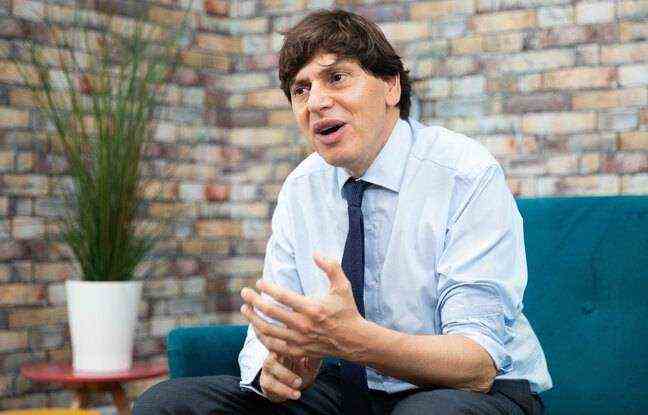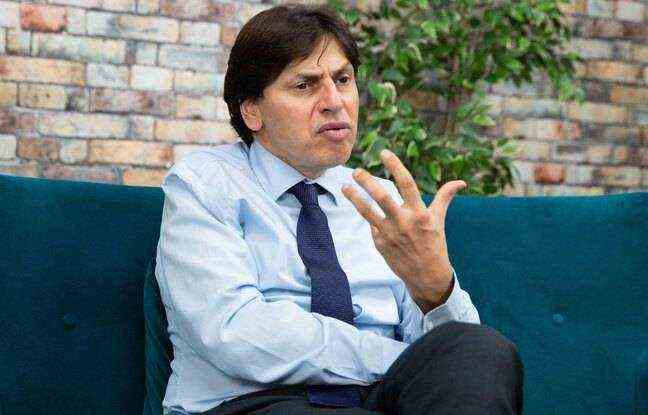They embody “the world after”, but who are they really? In The divide*, which has just been published, Frédéric Dabi, director general opinion of Ifop, and Stewart Chau, head of political studies at the Viavoice institute, draw a portrait of 18-30 year olds, thanks to the analysis of five major surveys carried out on youth by Ifop since the 1950s.
A book that allows them to better understand their values, their doubts, their hopes. For 20 minutes, Frédéric Dabi delivers his analysis on 18-30 year olds, who will be the subject of much attention in this election year.
You portray youth by showing that it is not unique, but multiple. What are the main points of fracture between these different youths?
The original idea of this book is to characterize this youth. As it is quite elusive, we tend to attach labels to it: Generation Z, climate, Greta Thunberg, sacrificed… It is rather simplistic, because there are divisions between young people, in particular linked to their age. 18-24 people are generally more optimistic: they live with or near their parents, are often students, believe in themselves, have quickly turned the page on coronavirus. The 24-30 year olds are more worried about their future, because this is the generation of integration, which in a context of crisis, has difficulty starting their professional life. Divisions that are felt in their desire to vote. There is also a gender divide. Young women, for example, are more advanced in the fight against discrimination.
A majority of young people say they are living in unlucky times. Is this only attributable to the Covid-19 crisis?
In twenty years, we have gone from 15% to 30% of young people believing that they are living in a time of absolute bad luck. They feel a sense of vulnerability in the face of the chain of crises: attacks, climate shock… And the Covid-19 crisis was the catalyst for a generation that believes itself to be cursed. Young people have the impression of having been sacrificed for the benefit of the elderly, of having been stigmatized, of having to pay future debt. In addition, they feel mistrust of the state, parties and unions. And they believe that society produces inequalities in a systemic way. There is a loss of ideal, a disenchantment.
Paradoxically, this negative outlook on society is accompanied by optimism about their own future. How to explain it?
The chain of crises has shown their ability to withstand shocks. They feel a very strong individual optimism, and the Covid-19 has not dampened their thirst for life, their appetite to discover the world, to have experiences.
Why do young people consider France to be in decline?
They believe that the country has not been up to the task in the face of the Covid-19 crisis. They were struck by the gap between Emmanuel Macron’s speech “We are at war” and the fact that the hospitals were not ready, France’s delay in the vaccination strategy, the impoverishment of part of the population. population… All these signs ended up making them believe that France was in decline. When asked about our country’s assets, they evoke these heritage assets: tourism, gastronomy… And not its ability to influence the world, its economic assets.
You show their attachment to traditional values like family, work, merit, authority. How do you explain it?
For thirty years, there has been a tendency to align the values of young people with those of their elders. They make their bargain between traditional values and more modern values. The family is adored because it was very often a refuge during the period of very high uncertainty of the Covid-19. It is no longer the place of conflict concerning sexuality, the evolution of mores. Work is also sacred by this generation, because it is seen as a source of fulfillment. Other observations: young people speak pro-business, perceive the assistantship as a foil …

The voices of young people are sometimes dissonant on societal issues, in particular on secularism …
It’s not Generation Charlie. After the death of Samuel Paty, a poll indicated that 33% of young people felt that it was not justified for a teacher to show religious cartoons to illustrate freedom of expression. Many believe that secularism is used to denigrate Muslims. They fail to distinguish blasphemy and discriminatory statements against believers. Which brings them to a new definition of inclusive secularism where religions would be made visible.
For the first time in forty years, 51% of 18-30 year olds say they believe in God. Will the weight of religion be more significant in their lives than for their elders?
There is an orthopraxy [le fait de suivre les préceptes d’une religion] growing among young Catholics, Jews and Muslims. Because they want to have benchmarks. This seems to prove Malraux’s famous phrase: “The twenty-first century will be religious or it will not be”. Our old republican model will be strongly challenged by the religious convictions of young people.
Why are they calling into question the French representativeness system?
They have the feeling that the Republic is running on empty. The State is considered incapable of acting on daily life, on climate change. They are in a logic of results which pushes them to commit individually and to advocate a participatory democracy.
Their distrust of power was also fed by the impression of ineffectiveness of previous governments. What do they blame them for?
They have strong expectations vis-à-vis political staff: honesty, loyalty to the program, consistency. When these qualities are lacking, they feel a form of betrayal. The confidence of young people has also been eroded by the inability of governments to transform their daily lives. It is a crisis of the result which makes them think that the solution will not come from the political sphere. Hence their feeling of the vanity of the vote.

One in two young people believe that violence can make a difference. Could this trend increase?
This remains a marginal mode of mobilization, only 13% of young people say they have committed acts of civil disobedience. It is less a reflection of violence for the sake of violence than of a feeling of legitimacy to act for oneself. I do not think that the use of violence will explode among the youngest in the coming years, unless we always continue to postpone until tomorrow what we could do today in terms of the environment or the fight against inequalities.
Their relationship to work is based on the interest of their position, but above all on the collective and even convivial dimension of the company. Aren’t they likely to be disappointed with the boom in teleworking?
They have the impression that the company is a community and explode the separation between personal and professional sphere. The majority of them believe that their colleagues are friends and the working atmosphere is the main attraction for young executives. The Covid-19 played a role in accelerating this trend by putting the little boss to death. Teleworking certainly facilitates personal organization, but leads to a loss of contact with colleagues which creates stress, anomie and anxiety. Young people therefore want à la carte teleworking, but not generalized.
Is the massive abstention of young people in 2022 inevitable?
Youth abstention is not inevitable. In some presidential elections, they voted as much as the rest of the population: for example in 1981, 1995, 2007, which were elections of change. Today, we observe an abstentionist cycle never seen among young people: with 70% in municipal and 84% in regional. The presidential election is part of a continuum and I fear that we are on the model of 2012 and 2017. But there is a kind of magic of the presidential election, and the candidates have never been so in proposals vis-à-vis the young people, whom they consider to be opinion leaders. We can also imagine that a campaign that will be very social networks, very media, interests young people.
And if the presidential candidates invested a lot in the theme of ecology and the treatment of inequalities, major concerns among young people, could this encourage them to vote?
Young people do not expect youth, paternalistic solicitude, TikTok videos. They expect a project, a vision, results. They are hungry for solutions. If the campaign revolves around these topics, maybe there will be some good surprises.

